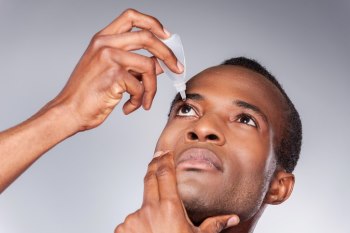Eye Allergy Overview
 Do your eyes ever water, itch, hurt, or become red or swollen? You may be experiencing allergic conjunctivitis or an ocular allergy, known commonly as an eye allergy.
Do your eyes ever water, itch, hurt, or become red or swollen? You may be experiencing allergic conjunctivitis or an ocular allergy, known commonly as an eye allergy.
Like all allergies, eye allergies start when the immune system identifies an otherwise harmless substance as an allergen. This causes your immune system to overreact and produce antibodies called Immunoglobulin E (IgE). These antibodies travel to cells that release chemicals, which cause an allergic reaction.
In this case, the reaction takes place around your eyes. Eye allergies occur when the conjunctiva becomes inflamed. This is the mucous membrane covering the white of the eye and the inner side of the eyelid.
What Causes Eye Allergies?
The most common causes of eye allergies are seasonal allergies to pollen and mold spores. People with seasonal hay fever (allergic rhinitis) normally notice their symptoms worsen when they go outdoors on days with high pollen counts.
Indoor allergens, such as dust mites and pet dander, can also cause eye allergies year-round. If you suffer from this type of allergy, you may notice your symptoms worsen during certain activities such as cleaning your house or grooming a pet.
Symptoms and Diagnosis
If your symptoms are related to an eye allergy, chances are you will have problems in both eyes. Typical symptoms include:
• Watery eyes
• Itchiness
• Sensitivity to light
• Redness
• Grittiness
• Eyelid swelling
These symptoms can occur alone or along with allergic rhinitis nasal symptoms. They typically appear shortly after exposure to the allergen.
An allergist / immunologist, often referred to as an allergist, has specialized training and experience to determine which allergens are causing your symptoms and discuss which treatment options are right for you. An allergist / immunologist can also offer valuable advice for avoiding your triggers.
Your allergist will take a detailed health history, perform a physical exam and then most likely test you for allergies. Skin prick tests may show the results within 20 minutes, though delayed reactions may take longer to appear. Blood tests and conjunctival challenge tests may also be considered.
An allergist performing a conjuctival challenge test will apply either dry materials or liquid materials, containing allergen concentrations, to one eye and apply a placebo to the other eye to serve as a control.
Avoiding Triggers
Whether you are allergic to indoor or outdoor allergies, avoidance is the key to relief. Here are simple steps you can take to limit your exposure to outdoor allergies, like pollen and mold:
• Keep your windows closed at night and if possible, use air conditioning, which cleans, cools and dries the air.
• Try to stay indoors when the pollen or mold counts are high. When you return indoors, take a shower, shampoo your hair and change clothes.
• Avoid being responsible for mowing lawns or raking leaves. This stirs up pollen and molds. Also avoid hanging sheets or clothes outside to dry.
• When traveling by car, keep your windows closed.
• Wear a hat with a wide brim to reduce the amount of allergen that blows into the eyes.
• Sunglasses can also help reduce the amount of allergen that lands in the eyes.
• Apply saline eye drops to the eyes after being outdoors to wash away allergens from the ocular lining.
It’s more difficult to avoid indoor allergies, like dust or pet dander, but you can take steps to avoid exposure. Use a vacuum with a HEPA filter to reduce dust in your home and try keeping pets out of the bedroom to reduce exposure to their dander when you sleep.
Treatment and Relief
Eye allergy symptoms can be very annoying, but the good news is that they pose little threat to eyesight, other than temporary blurriness. Moreover, allergic conjunctivitis is not contagious.
Over-the-counter oral antihistamine pills and eye drops are often used for short-term treatment of eye allergy symptoms. However, prolonged use of some eye drops may actually make your symptoms worse.
Your allergist / immunologist may prescribe stronger medications if your symptoms are long-lasting.
Corticosteroid eye drops are effective, but they often have side effects, even when used only for a short time. Use of this medication should be managed by an ophthalmologist due to the risk of side effects, such as glaucoma (increased ocular pressure), cataracts and infection.
Depending on what is causing your eye allergy symptoms, immunotherapy (allergy shots and tablets) can be very effective in providing long-term resistance to the triggering allergens. The concept behind immunotherapy (allergy shots and tablets) is that the immune system can be desensitized to specific allergens that trigger allergy symptoms in the first place.
Healthy Tips
• Eye allergies start when the immune system identifies an otherwise harmless substance as an allergen. This causes your immune system to overreact and release chemicals which cause an allergic reaction. In this case, the reaction takes place around your eyes.
• Eye allergies are caused by seasonal or year-long allergies and may be treated with eye drops, oral medications or allergy immunotherapy. It is best to avoid your allergic triggers.
Feel Better. Live Better.
An allergist / immunologist, often referred to as an allergist, is a pediatrician or internist with at least two additional years of specialized training in the diagnosis and treatment of allergies, asthma, immune deficiencies and other immunologic diseases.
By visiting the office of an allergist, you can expect an accurate diagnosis, a treatment plan that works and educational information to help you manage your disease and feel better.
The AAAAI's Find an Allergist / Immunologist service is a trusted resource to help you find a specialist close to home.
Find out more about eye allergies.
12/11/2023